 |
 |
 |
 |
 |
 |
| |
 |
|
 |
 |
 |
  |
  |
 |
 |
 |
 |
|
|
 |
|
 |
 |
 |
BUILDING |
 |
|
 |
|
 |
 |
 |
| |
 |
| 
 |
Actelion Business Center
|
|
 |
 |
 |
 |
DESIGNER |
 |
|
|
 |
|
 |
 |
 |
| |
 |
|
 |
 |
 |
 |
DESCRIPTION |
 |
|
|
 |
|
 |
 |
 |
|
|
 |
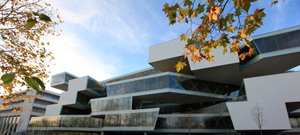 The Actelion Business Center is the heart of the Actelion Center in Allschwil, Switzerland. It offers 350 offices for employees from central functions. The Actelion Business Center is the heart of the Actelion Center in Allschwil, Switzerland. It offers 350 offices for employees from central functions.
The building, a creation of the Basel architects’ office of Herzog & de Meuron, stands for innovation and openness and thus stands for the core values of Actelion. The futuristic architectural concept symbolizes the company's future-oriented business activity. The building combines functionality and creativity. It offers employees an inspiring working environment that fosters communication. |
|
 |
 |
 |
|
 |
|
| Communication as an underlying theme |
 |
|
 |
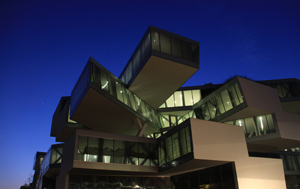 The architectural concept is guided by the underlying theme of communication.The open, angular steel construction consists of supports stacked on top of each other. Every floor is laid out differently. This fundamental principle is based on a strict regularity: in the four corner points, where the “office beams” meet, are the core zones through which access is provided to the whole building. Here, elevators and stairs link the various floors with each other. This gives rise to natural communication zones where employees' paths cross. In these zones there are kitchens, meeting rooms and training rooms. Seating islands invite people to sit down and exchange ideas. The architectural concept is guided by the underlying theme of communication.The open, angular steel construction consists of supports stacked on top of each other. Every floor is laid out differently. This fundamental principle is based on a strict regularity: in the four corner points, where the “office beams” meet, are the core zones through which access is provided to the whole building. Here, elevators and stairs link the various floors with each other. This gives rise to natural communication zones where employees' paths cross. In these zones there are kitchens, meeting rooms and training rooms. Seating islands invite people to sit down and exchange ideas.
The glass facades allow communication through eye contact and underline the transparency, both inwards and outwards, as well as upwards and downwards. To ensure that this openness is consistent throughout, all installations were laid in the floors and ceilings, and it was decided to avoid any ducts and piping in walls.
The stacking principle provides for free roof areas, which are planted with grass or conceived as roof terraces on the third and fifth floors. This ensures that the eye is treated to a varied landscape of architecture and nature.
The theme of 'communication and openness' is continued in the general, cross-shaped foyer. The central point in the hall is the reception area. In the four open side wings is the auditorium with seating for 120 people, the staff restaurant with seating for 230 that opens onto the inner courtyard, the cafeteria, meeting rooms and training rooms and an open, variable area for events. |
|
 |
 |
 |
|
 |
|
| Functionality meets creativity |
 |
|
 |
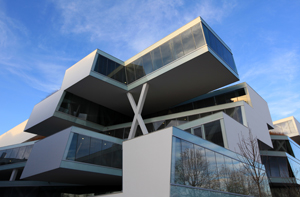 The structure of the building and the office units arranged as modules in the various beams show a high degree of functionality. This functionality is underlined by the use of simple materials. The room modules take the form of single office units, offices for two people or manageable open-plan offices that meet the different needs of the various work areas and allow a flexible use of the space. Besides the open-plan office areas, privacy rooms offer places of retreat, where people can work or talk without being disturbed. The structure of the building and the office units arranged as modules in the various beams show a high degree of functionality. This functionality is underlined by the use of simple materials. The room modules take the form of single office units, offices for two people or manageable open-plan offices that meet the different needs of the various work areas and allow a flexible use of the space. Besides the open-plan office areas, privacy rooms offer places of retreat, where people can work or talk without being disturbed.
The load-bearing structure is subdivided by the office arrangement into different sections, so that every office has a very different facade section. In this way, each office has its own individual character despite the linear arrangement of the rooms. |
|
 |
 |
 |
|
 |
|
| The art of botany |
 |
|
 |
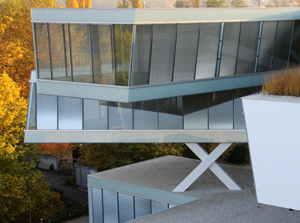 The greening concept of botanical artist Tita Giese takes up the transparency of the building. There is a mix of various kinds of ivy and horsetail in the shaded outdoor zones around the entrance area. Inside the building are three carpets of ferns, ivy, low-growing palms and Anthurias that spread outdoors, thus blurring the boundary between inside and outside. The greening concept of botanical artist Tita Giese takes up the transparency of the building. There is a mix of various kinds of ivy and horsetail in the shaded outdoor zones around the entrance area. Inside the building are three carpets of ferns, ivy, low-growing palms and Anthurias that spread outdoors, thus blurring the boundary between inside and outside.
In sunny areas the roofs are planted with prairie grass, which changes in the course of the seasons from light green to dark red, retaining this color in the winter. The other roof areas were provided with a plant substrate that grows independently according to climatic conditions. Depending on the sun and rainfall, a low-growing carpet of stonecrops alternate with unplanted gravel areas. |
|
 |
 |
 |
 |
 |
 |
 |
MATERIALS |
 |
|
|
 |
|
 |
 |
 |
 |
 |
|
steel 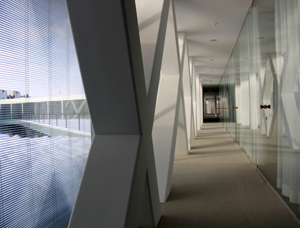 The load-bearing structure of the building consists of steel frames measuring a total of 3.8 kilometers in length. Altogether about 2,500 tons of steel were processed.The steel bars that make up the framework are straight, K-shaped or X-shaped, depending on the static requirements. For fire safety reasons, the steel construction is plastered and painted white. In this way, the characteristic steel elements underline the light visual identity of the building. The construction of the complex load-bearing structure was fraught with numerous challenges, because there were no previous examples to work on. In the course of construction, problems kept arising for which completely new solutions had to be found. The load-bearing structure of the building consists of steel frames measuring a total of 3.8 kilometers in length. Altogether about 2,500 tons of steel were processed.The steel bars that make up the framework are straight, K-shaped or X-shaped, depending on the static requirements. For fire safety reasons, the steel construction is plastered and painted white. In this way, the characteristic steel elements underline the light visual identity of the building. The construction of the complex load-bearing structure was fraught with numerous challenges, because there were no previous examples to work on. In the course of construction, problems kept arising for which completely new solutions had to be found.
|
|
 |
 |
 |
 |
ECO-SUSTAINABILITY |
 |
|
|
 |
|
 |
 |
 |
| Features of energy |
 |
|
 |
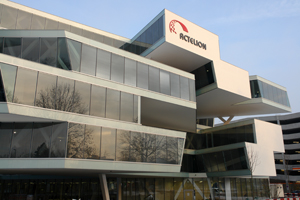 The energy concept of the building is based on the combined use of electricity, natural gas and renewable energy in the form of solar power. The aim is to meet the demand for heating and cooling in a way that conserves resources and is largely carbon neutral. The energy concept of the building is based on the combined use of electricity, natural gas and renewable energy in the form of solar power. The aim is to meet the demand for heating and cooling in a way that conserves resources and is largely carbon neutral.
The essential components of the climate concept are:
- Triple glazing of office windows that offer a high degree of insulation. In the gap between the two outer panes are louvers for sun protection that automatically adjust to the position of the sun, but can also be controlled manually by the office staff.
The glass facades are also designed in such a way that the exposed surfaces on the upper floors are inclined downwards and the shady surfaces on the lower floors are inclined upwards, in order to reduce the heat input from the sunlight.
- Photovoltaic cells as supporting technology for energy production.
- Thermal activation of the solid ceilings.
- Individually controllable heat distribution equipment in each individual office.
|
|
 |
 |
 |
 |
 |
 |
 |
LOCATION |
 |
|
|
 |
|
 |
 |
 |

|
 |

|
Continent |
|
 |
  Europe |
|
Nation |
|
 |
  Switzerland [Schweiz/Suisse] |
|
Canton |
|
 |
  Basel-Country [Basel-Land] |
|
District |
|
 |
  Arlesheim |
|
Town |
|
 |
  Allschwil |
|
Address |
|
 |
  Hegenheimermattweg (Bachgraben)
|
|
|
|
 |
|
Website |
|
 |
|
 |
 |
 |
 |
MAP |
 |
|
|
 |
|
 |
 |
 |
| |
 |
|
 |
 |
 |
 |
|
TYPOLOGY |
 |
|
|
 |
|
 |
 |
 |
Main |
 |
|
 |
ARCHITECTURE | Buildings for offices and professional practises
Offices
| |
|
|
 |
|
Additional |
 |
|
 |
ARCHITECTURE | Education buildings
Auditorium
Commercial buildings
Bars, cafeterias
Restaurants
Transport buildings and structures
Garages, car parking, etc.
| |
 |
 |
 |
 |
CHRONOLOGY |
 |
|
|
 |
|
 |
 |
 |
Project |
 |
|
 |
| 
 |
2007
|
|
Realisation |
 |
|
 |
| 
 |
2007 - 2010 |
|
 |
 |
 |
 |
BIBILIOGRAPHIC REFERENCES |
 |
|
|
 |
|
 |
 |
 |
|
 |
| Katharina Marchal, "Actelion Business Center, Allschwil, Schweiz. Transparenz und Dynamik / Actelion Business Center, Allschwil, Switzerland. Transparency and dynamism", Architektur Aktuell 378, september 2011 [Bauen mit Licht: Glas / Structures of light], pp. 74-83 (60-95) |
|
|
| "Centro Empresarial Actelion/Actelion Business Center", in Jean-François Chevrier (ed.), El Croquis 152-153, IV-V 2010 [Herzog & de Meuron. 2005-2010. Programa, monumento, paisaje/Programme, monument, landscape], pp. 250-275 |
|
 |
 |
 |
 |
 |
 |
 |
CLIENT |
 |
|
|
 |
|
 |
 |
 |
| |
 |
| Actelion Pharmaceuticals Ltd |
|
 |
 |
 |
 |
DIMENSIONAL
DATA |
 |
|
|
 |
|
 |
 |
 |
| Surface |
 |
|
 |
site sq.m. 7,610
footprint sq.m. 3,190
gross floor sq.m. 27,470
gross floor above ground sq.m. 15,020 |
|
| Widht |
 |
|
 |
|
| Lenght |
 |
|
 |
|
| Height |
 |
|
 |
|
| Volume |
 |
|
 |
total m³ 104,500
above ground m³ 65,900
below ground m³ 37,600 |
|
| Floors |
 |
|
 |
2 basement floors
6 upper floors |
|
| Capacity |
 |
|
 |
350 workplaces
auditorium 120 persons
restaurant 230 persons
parking 150 spaces |
|
 |
 |
 |
 |
STRUCTURES |
 |
|
|
 |
|
 |
 |
 |
| |
 |
|
 |
 |
 |
 |
STAFF |
 |
|
|
 |
|
 |
 |
 |
|
 |
|
Art intervention |
 |
|
 |
  |
 |
|
|